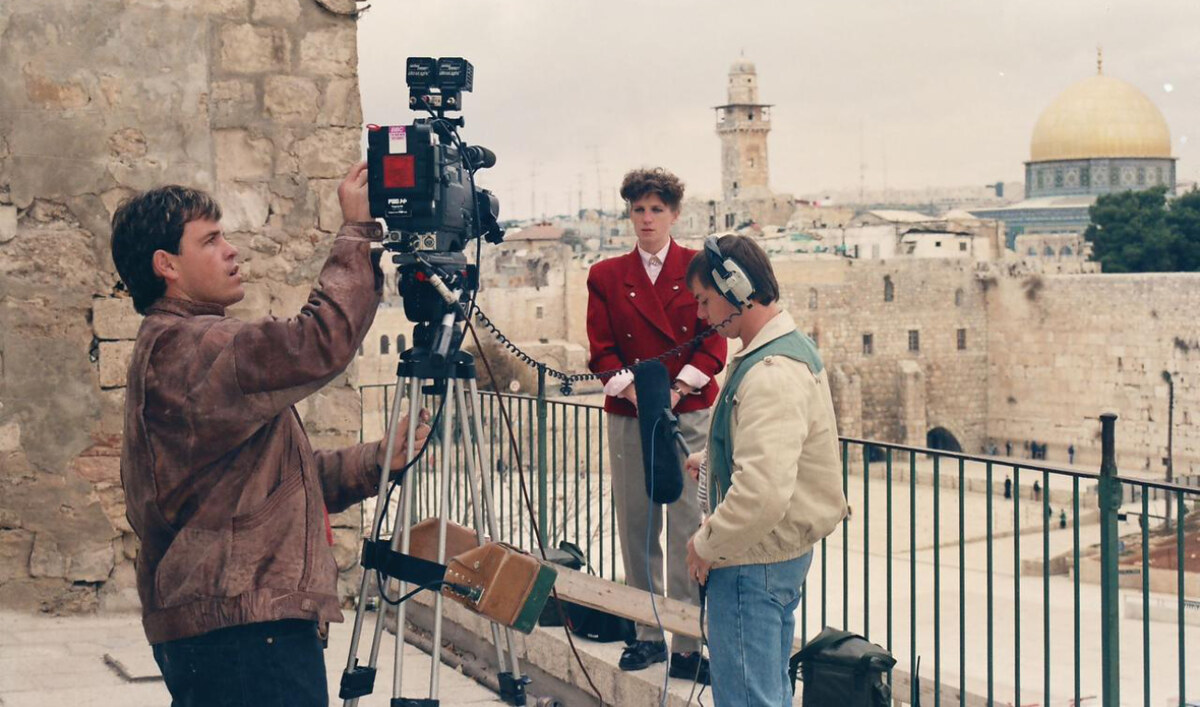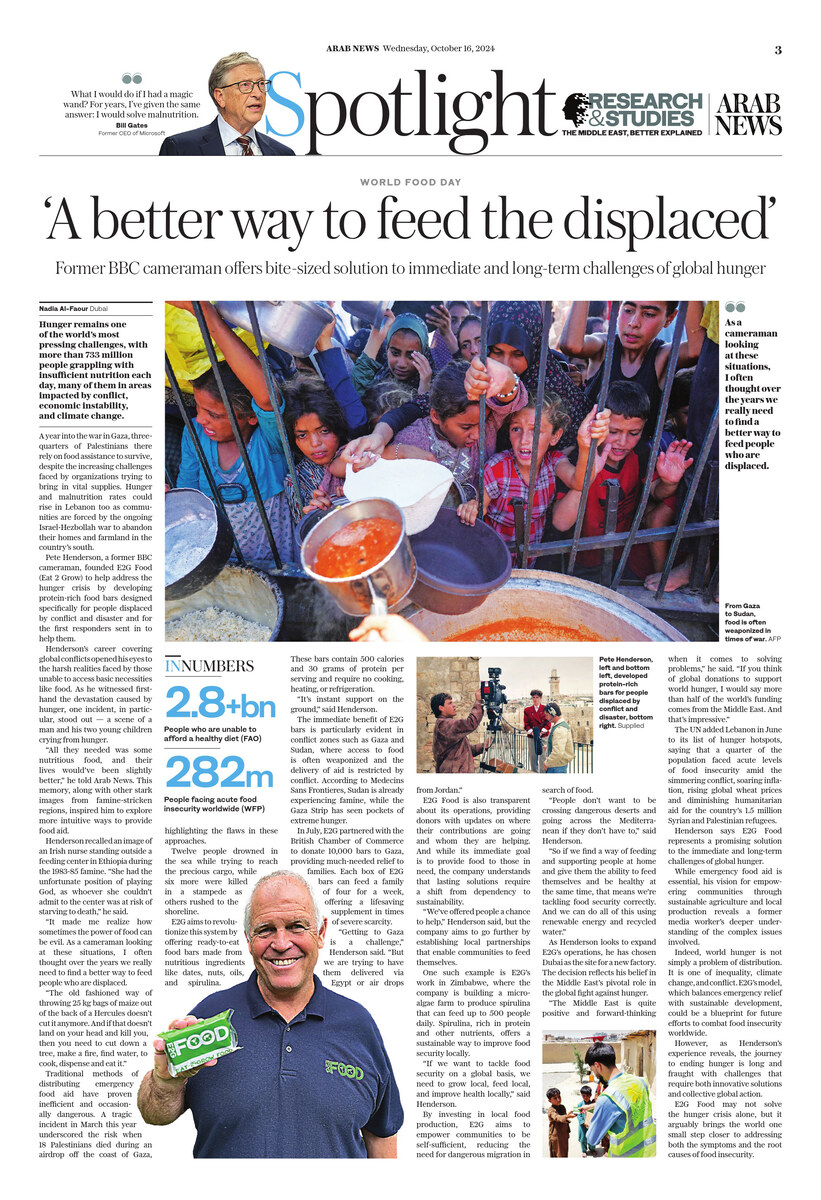DUBAI: Hunger remains one of the world’s most pressing challenges, with more than 733 million people grappling with insufficient nutrition each day, many of them in areas impacted by conflict, economic instability, and climate change.
A year into the war in Gaza, three-quarters of Palestinians there rely on food assistance to survive, despite the increasing challenges faced by organizations trying to bring in vital supplies. Hunger and malnutrition rates could rise in Lebanon too as communities are forced by the ongoing Israel-Hezbollah war to abandon their homes and farmland in the country’s south.
Pete Henderson, a former BBC cameraman, founded E2G Food (Eat 2 Grow) to help address the hunger crisis by developing protein-rich food bars designed specifically for people displaced by conflict and disaster and for the first responders sent in to help them.

E2G food bars contain 500 calories and 30 grams of protein per serving. (Supplied)
Henderson’s career covering global conflicts opened his eyes to the harsh realities faced by those unable to access basic necessities like food. As he witnessed firsthand the devastation caused by hunger, one incident, in particular, stood out — a scene of a man and his two young children crying from hunger.
“All they needed was some nutritious food, and their lives would’ve been slightly better,” he told Arab News. This memory, along with other stark images from famine-stricken regions, inspired him to explore more intuitive ways to provide food aid.

Palestinian boys sit amid the rubble of a building with their pots of soup at a food distribution point in the Jabalia refugee camp in northern Gaza Strip on August 21, 2024. (AFP)
Henderson recalled an image of an Irish nurse standing outside a feeding center in Ethiopia during the 1983-85 famine. “She had the unfortunate position of playing God, as whoever she couldn’t admit to the center was at risk of starving to death,” he said.
“It made me realize how sometimes the power of food can be evil. As a cameraman looking at these situations, I often thought over the years we really need to find a better way to feed people who are displaced.
“The old fashioned way of throwing 25 kg bags of maize out of the back of a Hercules doesn’t cut it anymore. And if that doesn’t land on your head and kill you, then you need to cut down a tree, make a fire, find water, to cook, dispense and eat it.”
Traditional methods of distributing emergency food aid have proven inefficient and occasionally dangerous. A tragic incident in March this year underscored the risk when 18 Palestinians died during an airdrop off the coast of Gaza, highlighting the flaws in these approaches.
IN NUMBERS
- 2.8+bn People who are unable to afford a healthy diet (FAO).
- 282m People facing acute food insecurity worldwide (WFP).
- 36m Children under 5 who are acutely malnourished (UNICEF).
- 3m Children facing most severe forms of malnutrition (UNICEF).
Twelve people drowned in the sea while trying to reach the precious cargo, while six more were killed in a stampede as others rushed to the shoreline.
E2G aims to revolutionize this system by offering ready-to-eat food bars made from nutritious ingredients like dates, nuts, oils, and spirulina. These bars contain 500 calories and 30 grams of protein per serving and require no cooking, heating, or refrigeration.
“It’s instant support on the ground,” said Henderson.
The immediate benefit of E2G bars is particularly evident in conflict zones such as Gaza and Sudan, where access to food is often weaponized and the delivery of aid is restricted by conflict. According to Medecins Sans Frontieres, Sudan is already experiencing famine, while the Gaza Strip has seen pockets of extreme hunger.

People line up to register for a potential food aid delivery at a camp for internally displaced persons in Agari, South Kordofan, on June 17, 2024. (AFP)
In July, E2G partnered with the British Chamber of Commerce to donate 10,000 bars to Gaza, providing much-needed relief to families. Each box of E2G bars can feed a family of four for a week, offering a life-saving supplement in times of severe scarcity.
“Getting to Gaza is a challenge,” Henderson said. “But we are trying to have them delivered via Egypt or air drops from Jordan.”
E2G Food is also transparent about its operations, providing donors with updates on where their contributions are going and whom they are helping. And while its immediate goal is to provide food to those in need, the company understands that lasting solutions require a shift from dependency to sustainability.
“We’ve offered people a chance to help,” Henderson said, but the company aims to go further by establishing local partnerships that enable communities to feed themselves.
One such example is E2G’s work in Zimbabwe, where the company is building a microalgae farm to produce spirulina that can feed up to 500 people daily. Spirulina, rich in protein and other nutrients, offers a sustainable way to improve food security locally.
“If we want to tackle food security on a global basis, we need to grow local, feed local, and improve health locally,” said Henderson.

E2G offers ready-to-eat food bars made from nutritious ingredients like dates, nuts, oils, and spirulina that require no cooking, heating, or refrigeration. (Supplied)
By investing in local food production, E2G aims to empower communities to be self-sufficient, reducing the need for dangerous migration in search of food.
“People don’t want to be crossing dangerous deserts and going across the Mediterranean if they don’t have to,” said Henderson.
“So if we find a way of feeding and supporting people at home and give them the ability to feed themselves and be healthy at the same time, that means we’re tackling food security correctly. And we can do all of this using renewable energy and recycled water.”
E2G’s holistic approach to hunger involves collaboration with established humanitarian organizations like the Red Cross, leveraging their expertise and distribution networks to reach the most vulnerable.
In the long term, the company seeks to improve food security while also creating job opportunities and encouraging sustainable agriculture in the regions it serves.

E2G Food bars enjoyed by a community in Kabul, Afghanistan. Distribution facilitated by Local Partner, Gulzad Group. (Supplied)
Fayaz King, UNICEF’s deputy executive director in Zimbabwe, praised E2G’s innovative approach.
“The E2G food bar is currently undergoing the WHO standard approval process for use in UN humanitarian and development initiatives,” King said, noting that the product is poised to play a role in global food security programs once approved.
He also highlighted the significance of E2G’s microalgae farm in Zimbabwe, calling it “a sustainable approach to addressing food security by involving local communities in the solution.”
As Henderson looks to expand E2G’s operations, he has chosen Dubai as the site for a new factory. The decision reflects his belief in the Middle East’s pivotal role in the global fight against hunger.
“The Middle East is quite positive and forward-thinking when it comes to solving problems,” he said. “If you think of global donations to support world hunger, I would say more than half of the world’s funding comes from the Middle East. And that’s impressive.”
FASTFACT
- World Food Day is observed every year on Oct. 16 to commemorate the date of the founding of the UN’s Food and Agriculture Organization in 1945.
The global hunger crisis has reached alarming levels, with nearly 282 million people across 59 countries facing acute food insecurity, according to the World Food Programme. This figure marks a significant rise compared to previous years.
Food crises have been exacerbated by persistent conflict and displacement, while inflation and rising food prices linked to the war in Ukraine continue to limit access to essentials for millions globally.
The UN added Lebanon in June to its list of hunger hotspots, saying that a quarter of the population faced acute levels of food insecurity amid the simmering conflict, soaring inflation, rising global wheat prices and diminishing humanitarian aid for the country’s 1.5 million Syrian and Palestinian refugees.
If the flow of assistance to Gaza does not resume, the UN estimates that 1 million vulnerable people will be deprived of this lifeline. There are around 100,000 tons of food positioned at different corridors, which is enough to feed over a million people for five months. However, the closure of crossing points, security issues and route disruptions at crossings are limiting aid delivery.

Displaced Sudanese queue to receive food portions at their makeshift camp in the eastern city of Gedaref on September 9, 2024. (AFP)
Particularly vulnerable are children and displaced populations. More than 36 million children under the age of five are acutely malnourished, with nearly 3 million facing the most severe forms of malnutrition, according to UNICEF.
Henderson says E2G Food represents a promising solution to the immediate and long-term challenges of global hunger.
While emergency food aid is essential, his vision for empowering communities through sustainable agriculture and local production reveals a former media worker’s deeper understanding of the complex issues involved.

E2G founder Peter Henderson working for BBC as a cameraman in Jerusalem in 1991. (Supplied)
Indeed, world hunger is not simply a problem of distribution. It is one of inequality, climate change, and conflict. E2G’s model, which balances emergency relief with sustainable development, could be a blueprint for future efforts to combat food insecurity worldwide.
However, as Henderson’s experience reveals, the journey to ending hunger is long and fraught with challenges that require both innovative solutions and collective global action.
E2G Food may not solve the hunger crisis alone, but it arguably brings the world one small step closer to addressing both the symptoms and the root causes of food insecurity.































